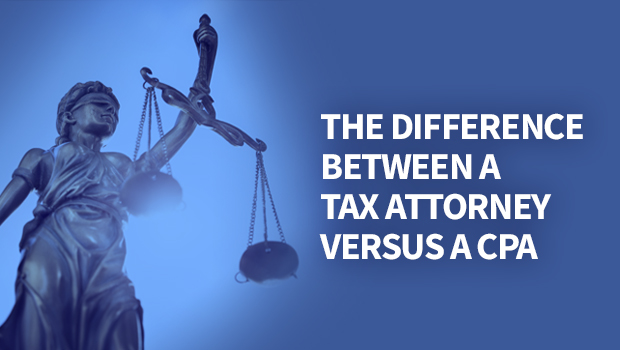To help individuals and businesses figure out their tax issues, there are two common types of professionals available. The first is the tax attorney and the second is the CPA, or certified public accountant.
Many taxpayers and can usually get by on their own or with another tax professional with lesser credentials. But for complex tax matters, the services of a tax attorney or CPA could be essential. But what’s the difference between the two types of professionals and why hire one over the other?
What Is a Tax Attorney?
A tax attorney is a type of attorney who focuses much (or all) of his or her practice on tax-related legal issues. However, the bulk of a tax attorney’s work deals with the nitty-gritty of the tax code and the legality of certain tax issues and scenarios. For example, a tax attorney can help a client with various legal matters, including:
- Representing the client in a lawsuit with the IRS.
- Defending the client during an IRS criminal investigation.
- Handling most matters than end up in tax court.
- Resolving tax liens and levies.
- Fighting wage garnishments.
- Assisting during a tax audit.
- Providing general tax legal advice.
To become a tax attorney, an individual must graduate from law school and pass a state’s bar exam. Yet most tax attorneys will have additional training and experience. For instance, many tax attorneys also have some form of tax, business or accounting background.
By way of example, LaDonna Kienitz, Esq. received her LL.M. (Master of Laws) from the University of San Diego and her Juris Doctor (Law) degree from Western State University College of Law. Her undergraduate degree was in Business Administration (M.M.) from the prestigious Kellogg School of Management at Northwestern University. She also has extensive municipal government experience, offering legal and budgetary advice to government officials.
What Is a CPA?
CPAs usually spend most of their time on financial and accounting issues. This means providing services, such as:
- Bookkeeping
- Tax return preparation and filing
- Tax planning
- Estate planning
- Asset management
- Tax audit assistance
States differ on the specifics for becoming a certified public accountant, but to become a CPA in most states, an individual must:
- Earn at least 150 hours of a college education.
- Pass the Uniform CPA exam.
- Obtain a minimum amount of accounting experience. For most states, it will be one to two years.
Should I Hire a Tax Attorney or Certified Public Accountant?
Depending on the tax service needed, hiring either a tax attorney or CPA may work for you. Tax attorneys and CPAs can usually help clients with:
- Filing tax returns (although most tax attorneys do this on a limited basis)
- Giving general tax advice, such as tax advantages of drawbacks of a given strategy.
- Providing tax planning advice and support.
- Assisting during a tax audit.
Despite this overlap in expertise and services, a client might prefer a CPA over a tax attorney if the client:
- Is more interested in the financial consequences of a decision as opposed to the legal consequences.
- Wants to save money with the preparation and filing of a tax return.
Clients will probably wish to hire a tax attorney if their needs:
- Are more likely to involve the legal consequences of a tax decision as opposed to the financial consequences.
- Require communication with the tax professional to be protected by attorney-client privilege. While an accountant-client privilege can exist, it’s often less widely recognized and provides fewer protections than the attorney-client privilege.
- Involve a tax-related crime.
- Is likely to end up in tax court.
The Bottom Line
In addition to the above differences, there could be other reasons for hiring a CPA or tax attorney, such as availability, cost and personal connection. The best thing to do is to meet with both a CPA and tax attorney and explain your situation and have them help you decide what’s best for you.
Do Not Ignore Your Tax Problems!
Tax Law is Our Specialty. Contact us to Get Your Life Back to Normal.

